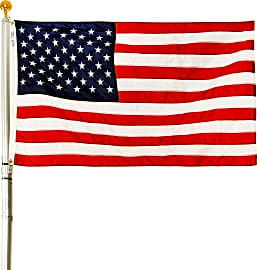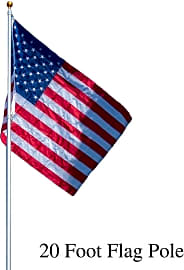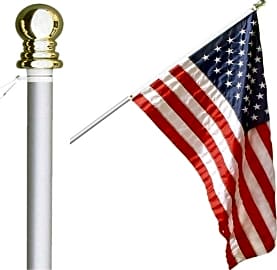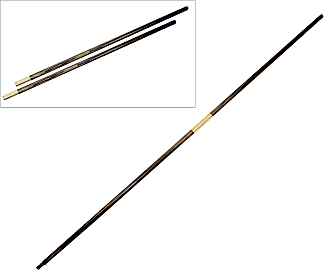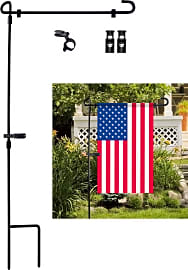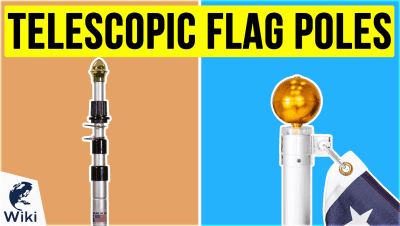The 10 Best Flag Poles

This wiki has been updated 41 times since it was first published in June of 2015. Perfect for the Fourth of July, Memorial Day, or all year round, these flag poles will let you show your national, school, or team pride. We've chosen models of varying sizes that are suitable for residences and offices, including both those that mount to the side of a building and those that should be installed in the ground. Some, but not all, come packaged with a flag. When users buy our independently chosen editorial recommendations, we may earn commissions to help fund the Wiki.
Editor's Notes
January 01, 2020:
At this time, we've decided to keep a range of models that require installation, as well as some that do not, but note that the amount and type of installation hardware included tends to vary. Some kits will come with everything you need, while some don't offer brackets and other mounting requirements. For this reason, you'll want to consider carefully what is included and whether you'll need to source additional items.
When it comes to those on the smaller side, we still find the Star Spangled Flags 6-Foot to be a good value, even though it does not include a mounting bracket. For the price, it's hard to beat its sturdy aluminum construction, especially when you consider that it rotates. There's also the stylish Evergreen Flag Estate Pole, but the finish can't take a lot of abuse, so it may not be the best choice for those who will forget to take it down in bad weather. For something a little larger, there's the EZpole Liberty Kit, offered in both 17- and 21-foot sizes. We added the Titan Telescoping 20-Foot, as well, which is a telescopic flag pole, just as its name suggests. It is on the more expensive side, but it's built for the long haul and includes a top-quality American flag made in the USA.
Special Honors
US Flag Store Single Mast Nautical The US Flag Store Single Mast Nautical is a 40-foot option, which is perhaps too large for some residential applications. Nevertheless, if you need something big, robust, and featuring a yardarm, it's definitely one to consider — if you can stomach the price. united-states-flag.com
Carrot-Top Industries Tilting Shoe Base Those who cannot perform an in-ground installation might consider the handy Carrot-Top Industries Tilting Shoe Base. A 20-foot, hinged choice, it can be mounted onto a concrete pad, which not only means it's relatively easy to install but also simple to lay on the ground in poor weather conditions. carrot-top.com
Federal Flags 25-Foot Commercial You won't have to worry much about the wind with the internal halyard Federal Flags 25-Foot Commercial. It is rated for 120 mph winds when flagged, and 222 mph winds when unflagged, so it has the stability you need for peace of mind. Plus, it includes all the installation hardware you'll require. federalflags.com
Pride And Symbolism
Flags and flagpoles are also commonly used by homeowners as a sign of self-respect, particularly during times of political turmoil and war.
Symbolism takes many forms across the world's cultures. In some cases, a symbol is used to convey a feeling or an emotion, while in other contexts, a symbol or object is used to instruct and warn. Regardless of the execution, iconic imagery has long been used to display a belief, a moment in time, a sense of pride, a social status of some type, or an instruction for doing something. For example, consider the concept of the flag. As soon as one sees the rows of stars and familiar red, white, and blue colors on the United States flag, they know that it represents pride, freedom, unity, and democracy.
A flag has come to denote more than just a sense of pride. For the military, the flag has also become synonymous with power and authority. Flags and flagpoles are also commonly used by homeowners as a sign of self-respect, particularly during times of political turmoil and war. Universities and schools often use flags and flagpoles to display their unique colors or mascots. Business owners use them as a way to attract customers to their stores. Without a way to display this imagery to a large group of people at one time, the symbol's importance is not as far-reaching. It stands to reason, then, that a flagpole is both functional and necessary for conveying a message from a high place so that many people can see it from a distance.
A flagpole is made out of either wood or metal and is typically taller than a person's reach. The flagpole has a built-in cord or rope that loops around a fixed pulley system at the top. Additionally, the rope ends are tied to the bottom of the pole, which allow for the raising and lowering of a flag along the pole's length. The top of the pole has a ball called a truck or finial. The truck can serve as both an ornamental feature for the pole as well as support for the pulley system.
Flagpoles can be designed as either single long pieces with steel tapers or they can be constructed with separate pieces that allow them to expand and contract. This comes in handy for smooth height adjustments. The flagpole also serves an additional purpose with respect to hoisting, which involves ceremonial behavior that is seen in raising or lowering a flag to half-mast, for example.
Modern construction of flagpoles consists of anodized aluminum in many cases. The flagpoles are coated in a solution containing either sulfur, chromic, or boric acid.
A Brief History Of Flagpoles
Flagpoles have a history that dates back thousands of years with the first known poles made exclusively from wood. Early woodworkers would use strips of available tree bark to construct rudimentary poles. They often used animal fat as a means to coat or protect the material. The problem with wooden flagpoles was that they were still quite susceptible to rotting and termites.
Flagpoles have a history that dates back thousands of years with the first known poles made exclusively from wood.
By the time of the industrial revolution, steel quickly replaced wood as the go-to construction material for most flagpoles. As early as 1893 and well into the 1900s, steel tubes and ship masts were used as common flagpoles. At the 1893 World’s Columbian Exposition held in Chicago, a steel tube 75 feet long was connected to a ship's 95-foot mast and sunk 10 feet into the ground. This pole is still in use today.
From the time of the 1929 stock market crash through the 1940s, the use of steel shafts encouraged the development of many flagpole manufacturers and led to the development of using aluminum to construct the poles. Today, anodized aluminum has become one of the main material standards for the construction of flagpoles.
Let's Run It Up The Flagpole
Since you're going to consider a flagpole to be a showpiece and attraction for your property and what you believe in, presentation is important. For that reason, investing in the sturdiest material and something with a shiny finish (i.e., anodized aluminum) will certainly draw attention, while also being able to withstand the elements over time. Many poles come with a maximum wind allowance rating, so one must be certain to consider the type of climate the pole will reside in before deciding which type to purchase. A gold flagpole topper can also add to your elegant display.
Internal halyards also allow for quiet hoisting and lowering, as there is less to bang against the pole itself.
Finding a flagpole with telescoping adjustments or several connecting sections will also come in handy if you prefer different heights for displaying your flags.
Other flagpoles offer a pulley system that will allow you to display more than one flag in the air at a time. That said, if your family identifies with multiple nationalities or sports teams, then you can display all those colors and designs proudly at one location.
One final attribute to consider is whether you prefer to use an internal or external halyard. Flagpoles with internal halyards may cost a bit more than those with external halyards, but the internal halyards also provide additional security from flag theft. Internal halyards also allow for quiet hoisting and lowering, as there is less to bang against the pole itself.


